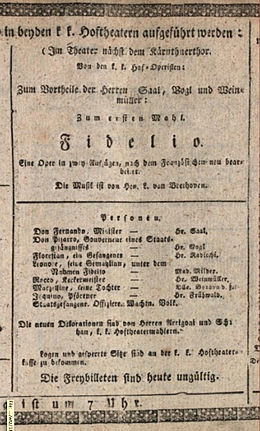Leonore Overture No. 3
| Fidelio | |
|---|---|
| Opera by Ludwig van Beethoven | |

Fidelio, playbill of the third and finalized premiere at the Kärntnertortheater in Vienna, 23 May 1814
|
|
| Librettist | Originally prepared by Joseph Sonnleithner, from the French of Jean-Nicolas Bouilly. Later shortened by Stephan von Breuning and edited by Georg Friedrich Treitschke. |
| Language | German |
| Premiere | Original premiere 20 November 1805; reworked version 29 March 1806; finalized version 23 May 1814. First two premieres at Theater an der Wien, Vienna. Finalized version at Kärntnertortheater, Vienna |
Fidelio (originally titled Leonore, oder Der Triumph der ehelichen Liebe; English: Leonore, or The Triumph of Marital Love),Op. 72, is Ludwig van Beethoven's only opera. The German libretto was originally prepared by Joseph Sonnleithner from the French of Jean-Nicolas Bouilly, with the work premiering at Vienna's Theater an der Wien on 20 November 1805. The following year, Stephan von Breuning helped shorten the work from three acts to two. After further work on the libretto by Georg Friedrich Treitschke, a final version was performed at the Kärntnertortheater on 23 May 1814. By convention, both of the first two versions are referred to as Leonore.
The libretto, with some spoken dialogue, tells how Leonore, disguised as a prison guard named "Fidelio", rescues her husband Florestan from death in a political prison. Bouilly's scenario fits Beethoven's aesthetic and political outlook: a story of personal sacrifice, heroism, and eventual triumph. With its underlying struggle for liberty and justice mirroring contemporary political movements in Europe, such topics are typical of Beethoven's "middle period". Notable moments in the opera include the "Prisoners' Chorus" (O welche Lust—"O what a joy"), an ode to freedom sung by a chorus of political prisoners, Florestan's vision of Leonore come as an angel to rescue him, and the scene in which the rescue finally takes place. The finale celebrates Leonore's bravery with alternating contributions of soloists and chorus.
The work has a long and complicated history of composition: it went through three versions during Beethoven's career, and some of the music was first written as part of an earlier, never-completed opera.
The distant origin of Fidelio dates from 1803, when the librettist and impresario Emanuel Schikaneder worked out a contract with Beethoven to write an opera. The contract included free housing for Beethoven in the apartment complex that was part of Schikaneder's large suburban theater, the Theater an der Wien. Beethoven was to set a new libretto by Schikaneder, entitled Vestas Feuer; however, this libretto was not to Beethoven's liking. He spent about a month composing music for it, then abandoned it when the libretto for Fidelio came to his attention.
...
Wikipedia
